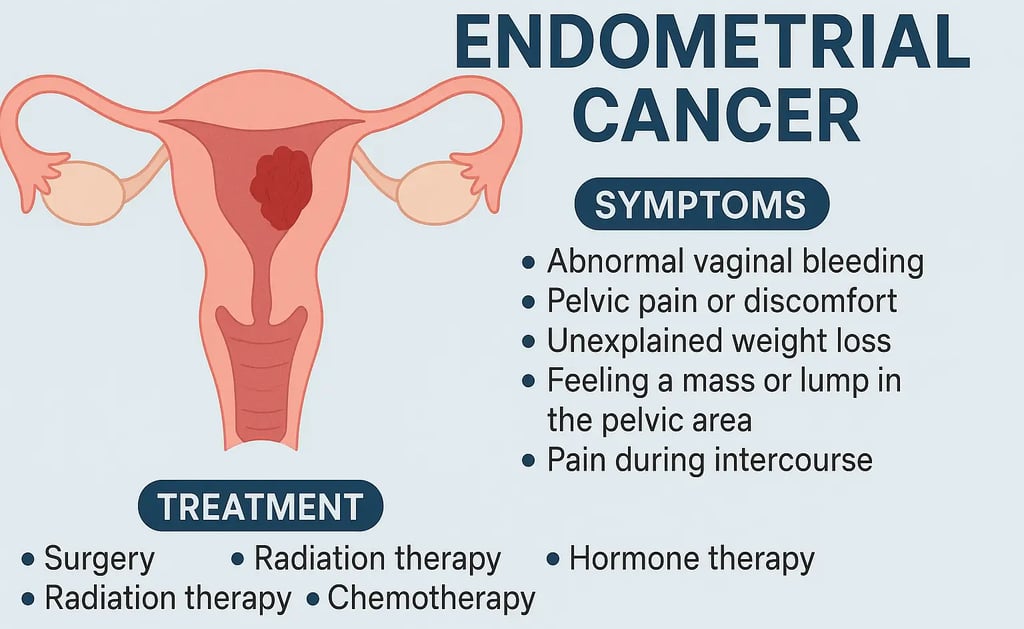Endometrial Cancer: Symptoms, Causes & Treatment Options Every Woman Should Know
Learn about (Uterine) endometrial cancer, its early symptoms, causes, risk factors, and treatment options. Detect signs early and seek timely medical help..


Understanding Endometrial Cancer: Causes, Symptoms & Treatment
Endometrial cancer, commonly referred to as uterine cancer, is a form of cancer that begins in the inner lining of the uterus, known as the endometrium. It is the most frequently diagnosed cancer of the female reproductive system.
This guide highlights the early warning signs, major causes, and latest treatment options for endometrial cancer.
Common Symptoms of Endometrial Cancer
Recognizing the early symptoms of uterine cancer can help ensure timely diagnosis and treatment. Key signs include:
Abnormal vaginal bleeding, especially after menopause or between menstrual cycles
Pelvic pain or pressure
Unexplained weight loss
Presence of a pelvic mass or lump
Pain during intercourse
If you notice any of these symptoms, it's essential to seek immediate medical advice for further evaluation.
What Causes Endometrial Cancer?
While the exact cause is still unknown, several risk factors can increase the likelihood of developing endometrial cancer:
1. High Estrogen Levels
Prolonged exposure to estrogen without enough progesterone can lead to endometrial overgrowth and raise cancer risk.
2. Obesity
Excess body fat can trigger hormonal imbalances, promoting cancer cell growth in the uterus.
3. Age and Menopause
Most cases occur in women over the age of 50, particularly after menopause.
4. Family History
A close relative with endometrial or colorectal cancer can elevate your risk.
5. Polycystic Ovary Syndrome (PCOS)
Hormonal disruptions from PCOS are linked to a higher risk of uterine cancer.
Effective Treatment Options for Endometrial Cancer
Treatment depends on several factors such as the stage of cancer, overall health, and individual preferences. Common therapies include:
🔹 Surgical Treatment
A hysterectomy—surgical removal of the uterus—is the most common option. In some cases, ovaries and fallopian tubes are also removed.
🔹 Radiation Therapy
Uses high-energy rays to target and destroy cancerous cells.
🔹 Chemotherapy
Involves drugs that travel through the bloodstream to kill cancer cells throughout the body.
🔹 Hormone Therapy
Helps slow the growth of cancer cells by lowering estrogen levels or blocking its effects.
Consult your oncologist to determine the most suitable treatment strategy for your condition.
Final Thoughts
Endometrial cancer is one of the most common reproductive cancers in women but is often highly treatable if caught early. Paying attention to unusual symptoms and understanding the risk factors can lead to early detection and better outcomes.
If you notice warning signs or have risk factors, don’t delay—consult a healthcare provider for a comprehensive evaluation.
